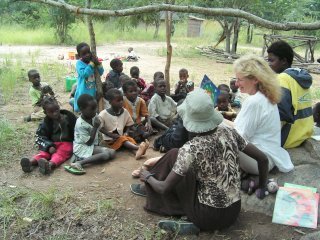 Preparation for what was to come included the news reports I read just prior to leaving which described droughts and fighting over food in Zimbabwe, and then on the plane's in-flight screen watching "The Constant Gardener" about pharmaceutical malpractice in Africa and a CNN story about fighting in Nigeria.
Preparation for what was to come included the news reports I read just prior to leaving which described droughts and fighting over food in Zimbabwe, and then on the plane's in-flight screen watching "The Constant Gardener" about pharmaceutical malpractice in Africa and a CNN story about fighting in Nigeria. But the on the descent into Harare Airport on the last leg of the travel, we saw wide expanses of flat green country dotted with trees, lots of water and very few signs of settlement. So much for the media - From West to East across this country anyway there has been more rain than they wanted, and its the excess water that has threatened their Maize crops this year.
But from the moment we landed we felt quite safe and unthreatened. Our journey in Zimbabwe took us to several small villages, to the tourist town of Victoria Falls, a Game Reserve, the Harare ghetto, and finally to the Eastern Highlands. Despite the obvious struggles and ever-present poverty this feeling never left us. All the early signs - that this trip was meant to be - were confirmed at each step, and with every lesson and exchange that made up our external and internal journeys.
Arrival at Kufunda village began with a greeting from Claudia, a young German woman, whose bubbly energy was contagious. She showed us around and made us feel at home. It rained just as we began unpacking, and a naked shower outside under the overhang from the thatched roof with bare feet on African soil was the first gift.
Zimbabwe is a country in crisis. The petrol queues are one visible sign of an economy on its knees. With the latest inflation figures at 700% the poor are being left behind and are not even stepping on the first rung of the economic ladder. Then imagine 700,000 people made homeless last year in a government mission politely called "The Big Cleanup" and known on the street as "The Tsunami." Bulldozers were used to knock down the people's shantytown shelters built in and around the city, which forced people to move out into the country - but unfortunately after years of colonisation and white-owned large scale commercial farming, they have minimal tools for this new life.
Step in Kufunda village. A small group of passionate Zimbabweans working to demonstrate and teach principles of self-reliance, and by all accounts being highly effective in their quiet unassuming way. Kufunda village was born four years ago, and given the political and economic landscape in which it has grown, what they have achieved in that time is remarkable. We had arrived a day early, so the Learning Journey began properly the following day when Bonnie from South Africa, and Steve and Matt from the US had arrived. The sixth participant was Chris from middle America, who had been staying at Kufunda for some time already, and offering his Permaculture wisdom and assistance.
A walk around the next day gave a feeling for how far they have come.
- composting toilets abound - the nutrients used to grow fruit trees,
- a large herb garden and processing room, where healing ointments and solutions are made to offer some assistance to the many people with AIDs and its symptoms,
- bee hives for honey and used as the base for some of the ointments,
- a pre-school (see picture above) - no building, but the children and teachers are doing wonderful work,
- kitchen facilities with wood cooking facility that uses minimal wood,
- library of books on a wide range of practical subjects,
- multiple dwellings and meeting rooms made with earth bricks using a cinva ram, and local thatch,
- vegetable gardens and young fruit trees.
There is probably much I missed in this list, but it gives you a feeling for the steps they have taken towards self-reliance in four short years, while also assisting many other villages to begin this process - but those stories are still to come. . .

1 comment:
Dear james and Kim,
Thank you for sharing your experiences. it sounds like you went to a place which to us in the first world appears to have no hope, but where you found hope aplenty. I'd like to know more about your learnings, and how we might begin to implement them here, as I agree with you that what you saw in Zimbabwe may be a glimpse at what we can expect here in a scant few years.
Peace,
marta
Post a Comment